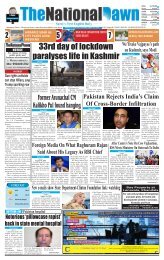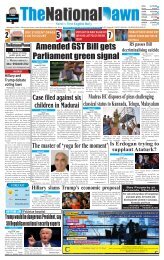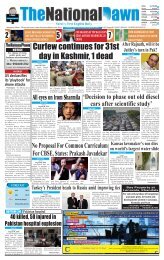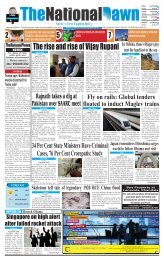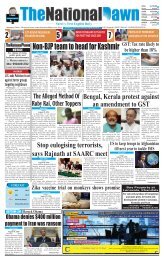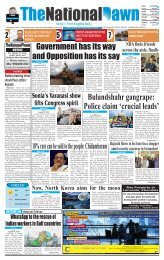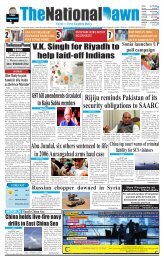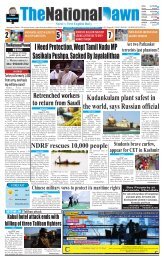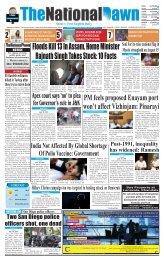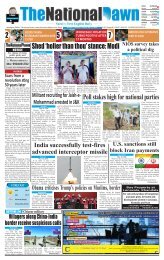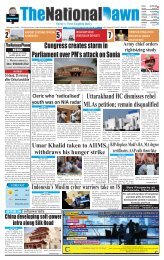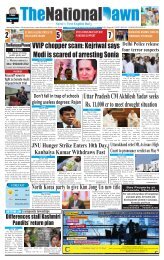March 22, 2016
Create successful ePaper yourself
Turn your PDF publications into a flip-book with our unique Google optimized e-Paper software.
Tuesday, <strong>22</strong> <strong>March</strong>, <strong>2016</strong><br />
Changing J-K youth<br />
Security forces including para-military contingents in Jammu and<br />
Kashmir besides Army at the international border and Line of Control<br />
(LoC) are doing yeoman’s job to thwart the ill-designs of Pakistan<br />
trained militants. The militant training camps in Pakistan occupied<br />
Kashmir (POK) being aided and encouraged by ISI since Independence<br />
have created havoc in the valley and succeeded in creating<br />
ill-will among some hardcore sections of people with sympathetic<br />
attitude towards Pakistan and anti-national elements. Such<br />
people have proved to be thorns in India’s body politic. The multidirectional<br />
groups like those launching Safar-i-Azadi for independent<br />
Kashmir, pro-Pakistani elements and the silent section sitting<br />
on the fence can slide to any convenient side that keeps them in<br />
peace and profit. The adverse effect of all such activities has left the<br />
state disrupted and under-developed. Without blaming any dispensation<br />
in the past, certain decisions and apathetic attitude towards<br />
the Jammu and Kashmir tangle, many problems have cropped<br />
up which have led to communal disturbances leading to Kashmiri<br />
Pandits’ exodus from the valley in the 90s. Such situations misled<br />
the youth who grew up in an atmosphere which made them biased<br />
against India. The militancy, under such circumstances, got entrenched<br />
in the Valley which succeeded in creating anti-national<br />
feelings among them against the country. Despite all these pressures,<br />
India has shown enough patience while dealing with the prevalent<br />
situation in that state. Security forces including the state police<br />
have exhibited enough maturity in handling the anger among youth<br />
of the state which have been incited by the inimical elements. Today,<br />
by and by, the youth in the Valley have started realising the<br />
real situation in relation to their future and prosperity of the state.<br />
Militancy, despite repeated efforts of the militant groups from across<br />
the border and LoC to create dissension in Jammu and Kashmir, is<br />
on the wane. A large number of youth from the state are getting<br />
recruited in Army, para-military forces besides being in the state<br />
police. CRPF Director General K Durga Prasad while reviewing the<br />
passing out parade of 514 cadets of 96 and 97 batch of the paramilitary<br />
force at Recruit Training Centre (RTC) at Humhama said, “There<br />
will be attempts to provoke the youth but we will continue to try to<br />
get them into mainstream.” Since its inception in 1990, the RTC has<br />
trained <strong>22</strong>,179 recruits by imparting intensive training on subjects<br />
concerned besides conditioning them to operate in different internal<br />
security situations. He was very positive while reviewing the<br />
situation, ‘‘We will counter militants’ attempts to provoke Kashmiri<br />
youths.’’ “We are working hand-in-hand with J&K police and we<br />
will control this problem,” Prasad said. He promised strong action<br />
against those crossing the Line of Control (LoC) and trying to disturb<br />
the unity of the country. There may be any situation in the<br />
state but terrorism has to end in the state and the youth of the state<br />
will realise their worth as a part of the Union.<br />
Dharamshala fallout<br />
India won in Kolkata but<br />
Himachal Pradesh lost it at<br />
Dharamshala.The shifting of T20<br />
World Cup match between India<br />
and Pakistan, slated for <strong>March</strong> 19,<br />
from Dhauladhar Stadium of<br />
Dharamshala in Himachal Pradesh<br />
to Kolkata, may not be a big incident<br />
for some people in power but<br />
it was a big loss to the state in terms<br />
of credibility for maintaining law<br />
and order and providing security<br />
to the visitors. The assumed phantoms<br />
of protests by ex-servicemen<br />
and other anti-Pakistan elements,<br />
as if they are as great in numbers<br />
as the militant-incited stone-pelting<br />
crowds of valley, are lame excuses.<br />
If no violence took place in<br />
Kolkata, it would not have taken<br />
place in Dharamshala also as the<br />
Chief Minister has always been<br />
claiming that Himachalis are peaceloving<br />
people. Even the families of<br />
martyred soldiers would have liked<br />
to see the Pakistani team vanquished<br />
in their home ground.<br />
The Home Minister of India had<br />
offered to send Central forces to<br />
help the state law and order machinery<br />
maintain security there but<br />
the Chief Minister had declined it.<br />
No doubt, it’s the Chief Minister’s<br />
prerogative to take decision on<br />
SCRIPSI<br />
such situation to see what is good<br />
for the state and what is not. But the<br />
youth of that state have their own<br />
ideas on this decision which will certainly<br />
get reflected during the fastapproaching<br />
state assembly elections.<br />
There is no problem if it is an administrative<br />
decision. There may be<br />
some loss to the tourism sector and<br />
denial of possibilities to further exposure<br />
of the scenic beauty of the<br />
Kangra valley. But people can’t be<br />
stopped from smelling the political<br />
rate. There is possibility that shifting<br />
of the venue of India- Pakistan match<br />
from Dharamshala to Kolkata may<br />
prove to be a disadvantage to this<br />
ground and the decision-makers, and<br />
the IPL matches, as there were reports<br />
also, may not be held there, it will be<br />
a big monetary loss to the tourism<br />
and non-use of infrastructure created<br />
for this purpose. Apart from the political<br />
rivalry, Anurag Thakur is the<br />
BCCI secretary besides being a Lok<br />
Sabha MP from Hamirpur, and despite<br />
different opinions and arguments,<br />
he has played a major role in<br />
bringing cricket to the state in a big<br />
way. In such a situation who is going<br />
to gain may be a question of conjecture,<br />
but the situation will have its<br />
fallout.<br />
We can easily forgive a child who is afraid of the dark; the real<br />
tragedy of life is when men are afraid of the light.<br />
- PLATO<br />
India seems to be in the middle of a counter-reformation<br />
The burden of proof<br />
Citizenship is a birthright; patriotism is an<br />
acquired attribute. None of us bawled "Bharat<br />
Mata ki jai" or "Jai Hind" in our cribs but we<br />
were, unconditionally, citizens of this country<br />
before we were continent and well before we<br />
learnt to think or act or walk or speak. This<br />
shouldn't need saying but in the present political<br />
climate, underlining the bl***ing obvious<br />
becomes a duty. Citizenship, in the jargon of<br />
medical insurance companies, is a pre-existing<br />
condition. Our rights as citizens cannot, should<br />
not, be taken away from us unless we break our<br />
republic's laws. It follows from this that citizenship<br />
and its attendant promise of life and liberty,<br />
cannot be subject to litmus tests of patriotism<br />
devised by political parties, celebrity nationalists,<br />
bureaucrats and gau rakshaks. But increasingly<br />
they are. Just the past week produced four<br />
examples of the way in which this birthright is<br />
being challenged by people who would argue<br />
that being law-abiding is not enough; Indians<br />
have to demonstrate that they are good citizens.<br />
The implication in each case is that if we aren't<br />
able or willing to perform designated patriotic<br />
exercises (or distance ourselves from unpatriotic<br />
ones) our standing as citizens, our rights, our<br />
liberties can legitimately be taken away from us.<br />
Let's discuss these four challenges in ascending<br />
order of awfulness. Anupam Kher, a distinguished<br />
actor who has recently acquired a reputation<br />
as the roving scourge of the politically<br />
correct, visited the Jawaharlal Nehru University's<br />
campus earlier this week to challenge the<br />
legitimacy of the post-bail political narrative first<br />
set out by Kanhaiya Kumar in his celebrated<br />
speech. In the question and answer session that<br />
followed Kher's speech, someone argued, in defence<br />
of JNU's student community, that the slogans<br />
shouted on that fateful evening, celebrating<br />
the imminent disintegration of India and denouncing<br />
those who had a hand in executing<br />
Afzal Guru, had been raised by outsiders. Kher's<br />
response was revealing. Did you, he asked, referring<br />
to JNU students in general, tear down the<br />
posters that celebrated Afzal Guru? No, you<br />
didn't. They remained stuck to the walls of university<br />
buildings for days. It was for Kher, a<br />
'gotcha' moment and it tells you everything that<br />
is important about the sarkari narrative on JNU.<br />
To be physically proximate to unpatriotic utterance<br />
calls your Indian bona fides into question.<br />
So the fact that JNU's students let those posters<br />
stay on JNU's walls was culpable in itself. For<br />
Kher, the university's students had been found<br />
wanting in Indianness. Instead of scraping the<br />
posters off the buildings as any passionate patriot<br />
would have done, they had lived with them.<br />
This inertness, was a kind of complicity. Citizens<br />
have to prove themselves. Citizenship, in Kher's<br />
view of the world, isn't a birthright; it's a kind of<br />
probation and you only truly belong when you<br />
learn to perform your patriotism. But Kher, despite<br />
his proximity to the ruling dispensation, is a<br />
private citizen. His opinions don't formally represent<br />
the view of the State. It's a much more serious<br />
business when the National Council for Promotion<br />
of Urdu Language circulates a form to writers<br />
in Urdu, asking them to certify that their books -<br />
novels, short stories, plays, poems, memoirs etc -<br />
contain nothing that is critical of the policies of the<br />
government or the interest of the nation. The<br />
NCPUL encourages literary production in Urdu by<br />
buying books in bulk, and according to the Indian<br />
Express, this new form is meant to put Urdu writers<br />
on notice "...that in case of a breach, the NCPUL<br />
can take legal action against the author and take<br />
back the monetary assistance". The NCPUL is a<br />
government organization and it answers to the<br />
ministry of human resource development. The decision<br />
to get Urdu writers to sign on to this form<br />
was taken last year. It is, on the face of it, extraordinary<br />
that the government of India should ask writers<br />
to guarantee that their books contain nothing<br />
that is against "the policies of the government" or<br />
"the interest of the nation" or that is likely to cause<br />
"disharmony of any sort between different classes<br />
of the country". It is bad enough that a government<br />
should ask writers to self-attest that their<br />
novels and poems and essays are utterly conformist<br />
and docile, but it is particularly worrying when<br />
writers in a particular language, Urdu, who happen<br />
to be overwhelmingly Muslim, are singled out to<br />
sign this humiliating undertaking. The NCPUL director's<br />
justification is breathtaking in its candour.<br />
"Since we do not have the manpower to scrutinise<br />
every single line of each book, this form helps us<br />
place the onus on the authors." The onus for<br />
what? Are Urdu writers, in the opinion of the<br />
NCPUL and the HRD ministry, in the habit of cobbling<br />
anti-national and communally inflammatory<br />
material into their work? Curiously, the equivalent<br />
policy of the National Council for Promotion<br />
of Sindhi Language contains no such stipulation.<br />
The lesson to take away from this seems to be<br />
that some citizens are allowed to take their patriotism<br />
for granted while the patriotism of others<br />
(in this case, writers in Urdu) needs formal selfattestation.<br />
This bullying enthusiasm for applying<br />
loyalty tests to law abiding citizens reached a<br />
new low when the Maharashtra assembly unanimously<br />
voted to suspend Waris Pathan, on the<br />
charge of disrespecting the country. Pathan's<br />
'crime' was refusing to say "Bharat Mata ki jai"<br />
when a Bharatiya Janata Party member of parliament<br />
insisted that he recite this slogan. The Nationalist<br />
Congress Party and the Congress joined<br />
the BJP in asking for Pathan's suspension and<br />
the Speaker caved in to their demand despite<br />
the fact that Pathan had done nothing to warrant<br />
suspension in terms of the assembly's own<br />
rules. Pathan's willingness to say "Jai Hind" as<br />
an alternative invocation of the nation was disregarded.<br />
Pathan was following the lead of his<br />
party leader, Asaduddin Owaisi, who had announced<br />
a few days earlier that nothing would<br />
make him say "Bharat Mata ki jai" It is one thing<br />
to criticize Owaisi's declaration as a form of political<br />
grandstanding (as Javed Akhtar did in<br />
Parliament); it is quite another to suspend a<br />
democratically elected member of the legislative<br />
assembly for refusing to jump through<br />
political hoops at the behest of hostile fellow<br />
legislators. In a country in which MLAs have<br />
been known to hold up proceedings, throw furniture<br />
about and even assault each other, to<br />
punish an MLA for not saying something, for<br />
refusing to mouth a slogan that he felt was contrary<br />
to his religious principles, is truly<br />
Kafkaesque. The rights of citizenship, the rules<br />
of representative government are being cynically<br />
bent to accommodate a bullying jingoism.<br />
My last example is a hideous tragedy. A man<br />
and a 12-year-old boy taking oxen to a cattle<br />
market were lynched in a village in Jharkhand<br />
and hung from a tree. They happen to be Muslim.<br />
The five men arrested in connection with<br />
these murders happen to be Hindus. One of<br />
the five happens to be connected to a cowprotection<br />
society. The superintendent of police<br />
in charge of the case thinks that, prima facie,<br />
this is a case of cattle looting gone wrong, but<br />
he is also investigating other possibilities including<br />
ideological motives related to gau<br />
raksha. On social media some right-wing commentators<br />
favour 'personal enmity' as the likelier<br />
explanation. They could be right but all of<br />
us should be deeply worried about the manner<br />
of this lynching. If this was a violent robbery<br />
that just happened to end in murder, why were<br />
the victims, one of them just a boy, left hanging<br />
on a tree? A hanging isn't just a murder, it is<br />
a kind of execution. When two Muslims in the<br />
cattle trade are lynched in this demonstrative<br />
way, it is reasonable to wonder if a message is<br />
intended. Jharkhand is a state ruled by the BJP.<br />
Unlike the lynching in Dadri, this one happened<br />
on its watch. This doesn't mean that Mohammad<br />
Majloom and Inayatullah Khan are exhibits A<br />
and B in some indictment of the BJP's Jharkhand<br />
government. We don't have to argue complicity<br />
to point out that Narendra Modi's regime, which<br />
Arun Shourie mocked as the UPA plus a cow,<br />
has consistently dog-whistled about cow protection.<br />
Local party workers, MLAs, MPs, ministers,<br />
chief ministers said vile and temporising<br />
things after the Dadri lynching. The BJP has<br />
consistently equivocated in the aftermath of gaurakshak<br />
violence; it should surprise no one if it<br />
turns out that Mohammad Majloom and<br />
Inayatullah Khan were lynched because their<br />
killers felt a sense of ideological impunity.<br />
Real progress or display ?<br />
Many people feel that Chandigarh life is better than Patiala life. Some of our friends<br />
have advised us to move to Chandigarh, or at least buy a small house or flat there.<br />
Sometimes I feel that we are creating more<br />
showpieces for display rather than having real<br />
development. I think real development takes<br />
into consideration priorities of the society and<br />
it tries to address needs of the majority of the<br />
population. On the other hand, showpieces<br />
serve the interests for small elite; those are<br />
mainly for showing off and really do not serve<br />
any other purpose for the majority of the<br />
population. For clarifying my point, I will give<br />
two examples; developing Chandigarh and<br />
opting for a bullet train. First, I want to clarify<br />
my feelings about Chandigarh. I really like to<br />
go to Chandigarh and I have to go to<br />
Chandigarh very frequently whenever I get a<br />
chance to visit Chandigarh. I have many<br />
friends there. Still, I always question myself if<br />
developing a city like Chandigarh shows that<br />
we are following a model of centralised development<br />
rather than decentralising the development?<br />
One sees so much construction going<br />
about Chandigarh (Mohali, Zirakpur, Kharar,<br />
Landran, Dera Bassi, and even up to Banur)<br />
that it looks more than the rest of Punjab<br />
combined. On the top of that we are developing<br />
a new city, New Chandigarh. Compared to<br />
Chandigarh, the other cities of Punjab like<br />
Amritsar, Ludhiana, Jalandhar and Patiala are<br />
falling behind, particularly Amritsar. One may<br />
say that Ludhiana was just declared a smart city<br />
and Chandigarh was not. I feel that the main<br />
reason for this is that Ludhiana has still some<br />
accumulated capital left from the days when its<br />
industry was booming. Probably, Ludhiana still<br />
has more money than the other cities of Punjab. I<br />
also want to make it clear that I think that for all<br />
practical purposes, Chandigarh is still a part of<br />
Punjab even though it is different politically and<br />
administratively. Whenever I am in Chandigarh, I<br />
do not feel that I am not in Punjab. Amritsar used<br />
to be the biggest city of Punjab (after Lahore). In<br />
1947, Amritsar had the largest population in<br />
Punjab, followed by Jalandhar and Ludhiana.<br />
Now, Ludhiana is the largest city of Punjab. I am<br />
not sure if Jalandhar has more population than<br />
Amritsar now. Amritsar can be called the religious<br />
and the<br />
spiritual centre of Punjab. Even today, more<br />
tourists come to Amritsar than any other city in<br />
Punjab. Amritsar has been developed to provide<br />
some facilities to the tourists yet, overall,<br />
Amritsar seems to be lagging behind in development<br />
and its infrastructure is outdated. I feel very<br />
sad about this. Patiala is another important<br />
traditional city of Punjab. Patiala is often called<br />
the cultural hub of Punjab. However, compared to<br />
Chandigarh, Patiala seems to be also losing its<br />
old glory. I have vivid memories of Patiala when I<br />
was 5-7 years old. I felt Patiala was better than<br />
any other city in Punjab or even in India wherever<br />
I had a chance to go. One of my doctor friends,<br />
who just died and who was born in Patiala and<br />
lived all his life here, maintained a strong<br />
feeling that Patiala was the best city to live in<br />
the world. I can give you the example of how<br />
the people of Patiala used to feel about their<br />
city compared to Chandigarh. In 1956, PEPSU<br />
(Patiala and the East Punjab State Union) was<br />
merged with Punjab. The capitol shifted from<br />
Patiala to Punjab. Most of the employees<br />
whose offices were shifted to Chandigarh<br />
continued to live in Patiala and used to<br />
commute from Patiala to Chandigarh. Even in<br />
1971, when I went to the US, the majority of<br />
people of Patiala continued to have the feeling<br />
that their city was better than Chandigarh.<br />
However, everything has changed now. Many<br />
people feel that Chandigarh life is better than<br />
Patiala life. Some people have shifted from<br />
Patiala to Chandigarh. Some of our friends<br />
have advised us to move to Chandigarh, or at<br />
least buy a small house or flat (condominium)<br />
there. It is not just the big cities, but the quality<br />
of life has deteriorated even in the smaller<br />
cities. Last month, I went to Barnala to present<br />
a paper. The venue was in the heart of the city.<br />
This part of the city is very congested. On the<br />
top of that, the railway crossing was closed<br />
because a train was passing. It made the bad<br />
situation worse and showed the poor and<br />
outdated infrastructure of our cities. I felt that<br />
instead of developing Chandigarh and New<br />
Chandigarh, maybe we would have been better<br />
off by improving the existing cities of Punjab.<br />
Starting a bullet train is a similar issue of<br />
developing for the sake of prestige and<br />
showing off rather than meeting the needs of<br />
the society. We are going to have bullet train<br />
connecting Mumbai to Ahmedabad. The<br />
Japanese are going to help us in this project. I<br />
heard that the Chinese were also approached<br />
for this project. However, they advised us that<br />
we will be better off spending that money in<br />
upgrading the existing railway infrastructure in<br />
India. This can increase the average speed of<br />
our trains from about 100 km an hour to about<br />
200 km an hour; computerise all of our stations,<br />
signals and crossings; and make our trains<br />
safer and better. Instead of that, we chose to<br />
have literally one track where the bullet train<br />
train can run at the speed of 300 km per hour.<br />
THE NATIONAL DAWN Printed, Published and Owned by Vikramrao Sanas and Printed at Taptilok Publication, 152-153, Shree Ram Industrial Estate, Pandesara, Surat (Gujarat) and Published at – S : 30, Kanaknidhi<br />
Complex, Opp. Gandhi Smruti Bhavan, Nanpura, Surat – 395 001 (Gujarat) Editor – Vikramrao Sanas is responsible for the news published in PRB ACT.



